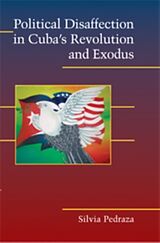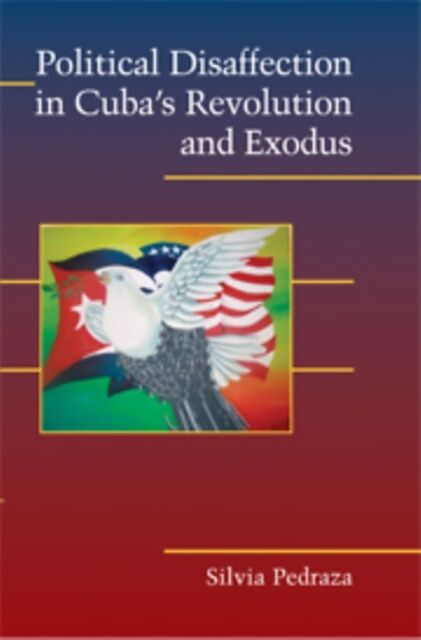Polit Disaffect Cuba Rev and Exodus
Einband:
Fester Einband
EAN:
9780521867870
Genre:
Business, Finance & Law
Autor:
Silvia Pedraza
Herausgeber:
Cambridge University Press
Erscheinungsdatum:
29.11.2007
Informationen zum Autor Silvia Pedraza is Associate Professor of Sociology at the University of Michigan. She is the author of Political and Economic Migrants in America: Cubans and Mexicans (1985) and the co-editor of Origins and Destinies: Immigration, Race, and Ethnicity in America (1996, with Ruben G. Rumbaut). She has also published articles in such journals as Social Science History and the Annual Review of Sociology. A child of the Cuban refugee exodus, she lived through both a dictatorship and a revolution, which left an indelible mark on her research. Klappentext The Cuban exodus is estimated to consist of around 12 percent of the country's population. It harbors several distinct waves of migrants, alike only in their final rejection of Cuba. Silvia Pedraza links the revolution and exodus not only as cause and consequence but also as profoundly social and human processes that were not only political and economic but also cognitive and emotive. Ironically for a community that defined itself as being in exile, virtually no studies of its political attitudes exist, and certainly none that encompass the changing political attitudes over 47 years of the exodus. Through the use of two major research strategies - participant observation and in-depth, semi-structured interviews - Pedraza captures the processes of political disaffection and emphasizes the contrasts among the four major waves of the exodus not only in their social characteristics but also in their attitudes as members of different political generations. Zusammenfassung In this book! Silvia Pedraza links Cuba's revolution and its mass exodus not only as cause and consequence but also as profoundly social and human processes that were not only political and economic but also cognitive and emotive. The book uses participant observation and in-depth interviews to gain insight into the political disaffection of Cuban refugees. Inhaltsverzeichnis 1. Political disaffection: Cuba's revolution and exodus; Part I. For and Against the Republic, For and Against the Revolution: the Cuban Exodus of 1959-1962 and 1965-1974: 2. The revolution defines itself: democracy; humanism; 3. The revolution deepens: nationalism, church vs. state; 4. The revolution redefines itself: socialism, Marxism-Leninism; 5. The revolution consolidated: old vs. new communists; political prisoners; the dialogue; Part II. The Children of Communism: the Cuban Exodus of 1980 and 1985-2004: 6. Los Marielitos of 1980: race, class, gender, and sexuality; 7. After the Soviet collapse: the Balsero crisis; 8. The last wave: political or economic immigrants?; Part III. Civil Society Returns: 9. The church and the rebirth of civil society; 10. Democratization and migration: the exodus and the development of civil society; 11. The impossible triangle: Cuba, the United States, and the exiles....
Klappentext
The Cuban exodus is estimated to consist of around 12 percent of the country's population. It harbors several distinct waves of migrants, alike only in their final rejection of Cuba. Silvia Pedraza links the revolution and exodus not only as cause and consequence but also as profoundly social and human processes that were not only political and economic but also cognitive and emotive. Ironically for a community that defined itself as being in exile, virtually no studies of its political attitudes exist, and certainly none that encompass the changing political attitudes over 47 years of the exodus. Through the use of two major research strategies - participant observation and in-depth, semi-structured interviews - Pedraza captures the processes of political disaffection and emphasizes the contrasts among the four major waves of the exodus not only in their social characteristics but also in their attitudes as members of different political generations.
Zusammenfassung
In this book, Silvia Pedraza links Cuba's revolution and its mass exodus not only as cause and consequence but also as profoundly social and human processes that were not only political and economic but also cognitive and emotive. The book uses participant observation and in-depth interviews to gain insight into the political disaffection of Cuban refugees.
Inhalt
1. Political disaffection: Cuba's revolution and exodus; Part I. For and Against the Republic, For and Against the Revolution: the Cuban Exodus of 1959-1962 and 1965-1974: 2. The revolution defines itself: democracy; humanism; 3. The revolution deepens: nationalism, church vs. state; 4. The revolution redefines itself: socialism, Marxism-Leninism; 5. The revolution consolidated: old vs. new communists; political prisoners; the dialogue; Part II. The Children of Communism: the Cuban Exodus of 1980 and 1985-2004: 6. Los Marielitos of 1980: race, class, gender, and sexuality; 7. After the Soviet collapse: the Balsero crisis; 8. The last wave: political or economic immigrants?; Part III. Civil Society Returns: 9. The church and the rebirth of civil society; 10. Democratization and migration: the exodus and the development of civil society; 11. The impossible triangle: Cuba, the United States, and the exiles.

Leider konnten wir für diesen Artikel keine Preise ermitteln ...
billigbuch.ch sucht jetzt für Sie die besten Angebote ...
Die aktuellen Verkaufspreise von 6 Onlineshops werden in Realtime abgefragt.
Sie können das gewünschte Produkt anschliessend direkt beim Anbieter Ihrer Wahl bestellen.
Loading...
Die aktuellen Verkaufspreise von 6 Onlineshops werden in Realtime abgefragt.
Sie können das gewünschte Produkt anschliessend direkt beim Anbieter Ihrer Wahl bestellen.
| # | Onlineshop | Preis CHF | Versand CHF | Total CHF | ||
|---|---|---|---|---|---|---|
| 1 | Seller | 0.00 | 0.00 | 0.00 |
